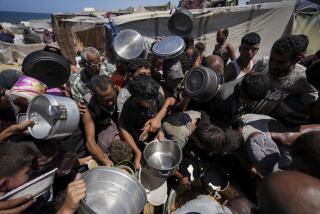U.S. Urges Allies to Back Bosnia Air Strikes : Balkans: Clinton calls threat of NATO attacks the ‘last chance’ to save the U.N. mission. Americans fear that protecting only one ‘safe area’ will allow Serbs to exploit the others.
- Share via
WASHINGTON — President Clinton warned Britain and France on Thursday that the allies’ threat to launch air strikes in Bosnia-Herzegovina is the “last chance” for the U.N. peacekeeping force there and called for “a strong air response to raise the price of Serbian aggression.”
“You can’t go about the world saying you’re going to do something and then not do it,” the President said at a news conference.
Aides said his remarks were aimed largely at Britain and France, which agreed last week to launch air strikes if needed to protect the Bosnian town of Gorazde but rejected U.S. pleas to authorize the same tactic in other parts of the country.
Apparently in response to the allies’ warning, Bosnian Serb forces stopped their advance on Gorazde--and instead stepped up their attacks on the capital of Sarajevo and the northwest Bosnian city of Bihac.
A White House official said that Clinton reopened the issue this week, asking British Prime Minister John Major and French President Jacques Chirac to authorize North Atlantic Treaty Organization air strikes around all four remaining U.N.-designated “safe areas”--Gorazde, Sarajevo, Bihac and the northern town of Tuzla--if U.N. commanders ask for them. Two other safe areas, Srebrenica and Zepa in eastern Bosnia, have been overrun by rebel Serbs.
“There’s a basic issue of Western resolve at stake here,” the official said. “Having asserted that resolve [by threatening air strikes around Gorazde], we can’t let the Serbs do an end run on a technicality.”
Frustration at the world’s failure to end the Bosnia crisis led to the resignation of the U.N. human rights investigator for the former Yugoslav federation.
“I believe we have a certain hypocrisy as far as Bosnia is concerned, when we are claiming to defend it but in fact we are abandoning it,” said Tadeusz Mazowiecki, a former prime minister of Poland. “. . . I hope that my decision will also be understood as a protest against this hypocrisy.”
NATO military experts in Brussels have been asked to draw up plans for air action to protect Sarajevo and Bihac, but Britain has resisted the idea of authorizing wider air strikes.
Clinton also reaffirmed his intention to veto a congressional resolution ending U.S. participation in the U.N. arms embargo in the
Balkans, and said he thinks he can gain the three Senate votes he needs to sustain the veto. The Senate passed the measure Wednesday by a vote of 69 to 29, or two votes more than needed to override a veto.
Clinton said he thinks that his success in thwarting an override vote “depends entirely on the vigor and the strength of the U.N. forces in Bosnia and their NATO allies.”
The U.N. peacekeeping force has patrolled Bosnia for more than three years but has failed to deter Bosnian Serb forces from conquering more than 70% of the country’s territory. Britain and France, with about 5,000 troops each, are the largest contributors to the force. The United States is not a participant.
In recent months, the U.N. troops have come under increasing attack, mostly from Bosnian Serb forces, and the contributing countries have threatened to withdraw their units.
“It has not worked. No one can say it has worked,” Clinton said at a news conference with visiting South Korean President Kim Young Sam.
“So I decided we’re either going to do what we said we were going to do with the U.N., or we’ll have to do something else. This is the last chance for UNPROFOR [the U.N. peacekeeping mission] to survive. But I do believe, if it can be made to work, it has a greater chance of securing a peace and minimizing death of the Bosnians.”
The President said that the United Nations failed to protect the safe areas in the past because the Bosnian Serbs retaliated by taking peacekeeping troops hostage. But now, with a European rapid-reaction force on the ground, the peacekeepers will not be as vulnerable, he said.
Officials said that preparations are complete for U.S.-led NATO air strikes on rebel Serb forces around Gorazde, if U.N. commanders request the attacks. But Gorazde has been relatively quiet since the allies made their threat.
*
Bosnian Serb forces have attacked government territory near Bihac but have not threatened the U.N. safe area around the town and have run into a counteroffensive by opposing Croatian forces, which are aiding the Bosnian government forces. “Bihac is very complicated, and we’re not quite sure where it’s going,” a U.S. official said.
It is not clear whether the Senate bill to lift the arms embargo will reach Clinton’s desk any time soon.
The House has not yet voted on the measure--and House members are hoping to go on vacation at the end of next week.
A White House official said that, even if the House approves the resolution next week, Clinton could delay a veto long enough to make it impossible for Congress to override him before September.
Times staff writers Art Pine and Elizabeth Shogren contributed to this report.
More to Read
Sign up for Essential California
The most important California stories and recommendations in your inbox every morning.
You may occasionally receive promotional content from the Los Angeles Times.














